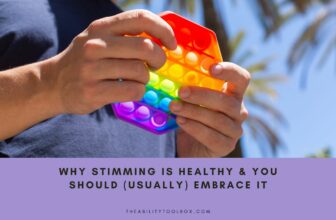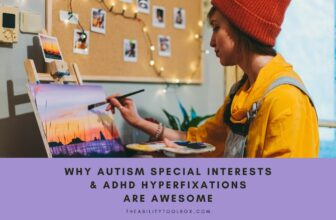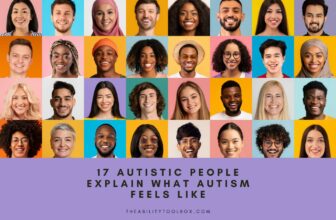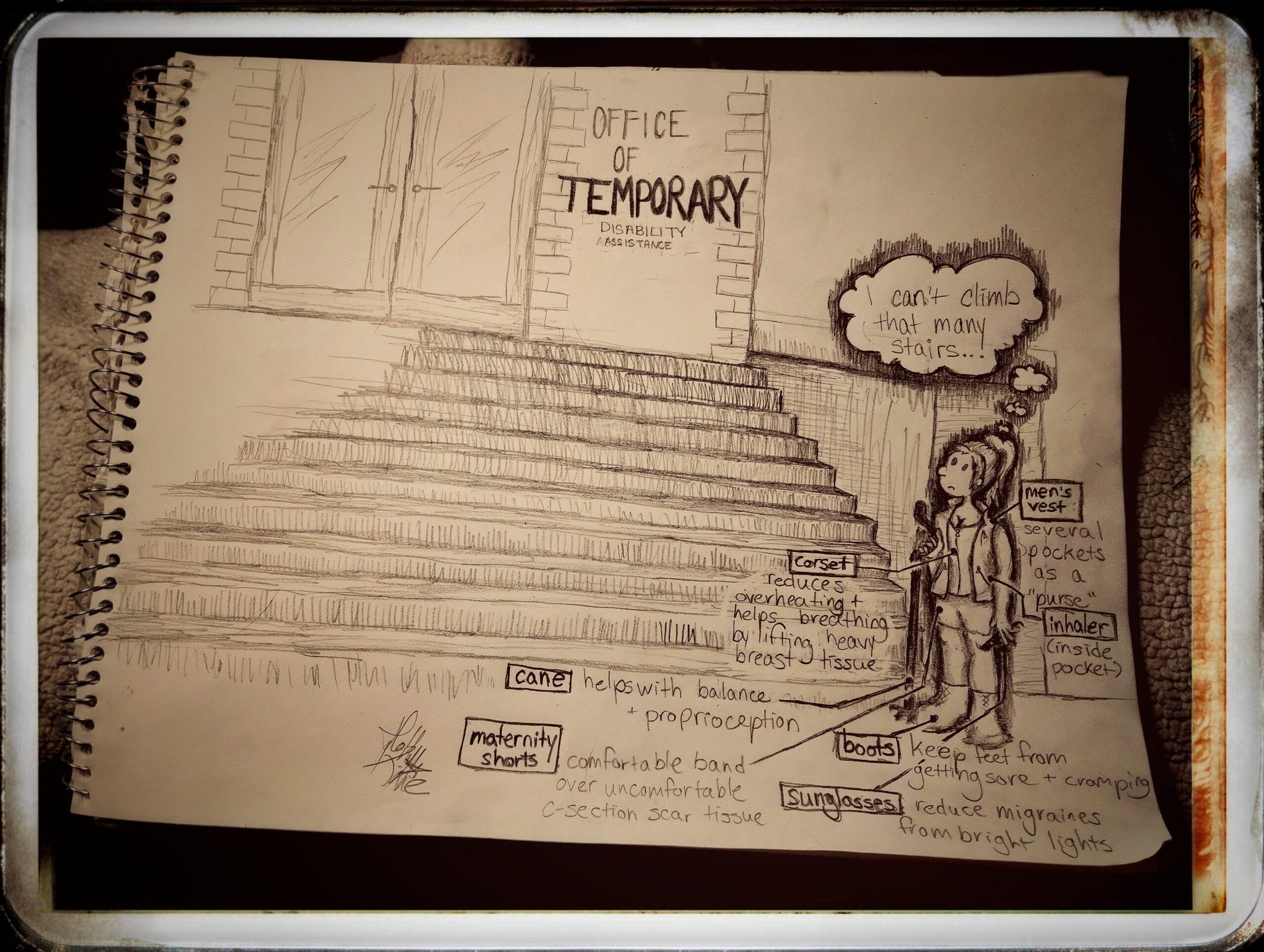
March 28, 2023
I have to chuckle at myself, albeit rather bitterly. I’m sitting here, finally starting this article for The Ability Toolbox, after having reached out to them about a month ago. See, they were specifically looking for autistic writers to pay during Autism Acceptance Month, and I take any under-the-table gig I can manage whilst waiting for my SSI case to settle (I just got the expected denial letter yesterday, and thankfully, my SSI lawyer has been fantastic about handling this case. Still took a year though, just to receive a denial).
The irony of being an autistic writer is not lost on me, and not for the reasons stereotypes would dictate, such as being “less intelligent,” or my cognitive disabilities being *obvious,* ergo visible, which = others are more likely to believe I have said disabilities, which therefore = decreases the chances of being dehumanized and dismissed. What was it the law says, able-bodied until proven otherwise? No, no, innocent until proven guilty, right?
I’m actually quite good with figurative use of language in orthography, especially sarcasm; italics and asterisks provide context for intentions in a way that spoken language cannot: the visuals. I can’t speak for my fellow synesthetes who have the sound → vision inductor/concurrent type. I am a mirror-touch though, which somehow manages to make aspects of my autism both easier and more difficult to relate to other humans. With mirror-touch, my body mirrors the emotions of others, sometimes even the physical sensations if the emotion is strong enough. For instance, I get vertigo looking at photos of sheer cliffs and heights, knees buckling, palms sweating, like the void itself is pulling me in, whispering, “It’s OK; fall.” My mirror-touch also helps me build emotional empathy, as in, I can understand some very dark, intense areas of human emotions that most people are afraid to think about, let alone explore.
On the flip side though, for many neurotypicals, there is a distinct empathy gap I have, that I am trying desperately hard to understand… I tend to lack emotional empathy, as in, feeling what they’re feeling, because of the gap in cognitive empathy — understanding the thoughts, beliefs, and subsequent choices of others.
What a paradox, huh?
Always a work in progress, but now at 29, I’ve gathered enough data about myself and others to at least figure out the following: because my brain is wired without the ability to make cognitive shortcuts like neurotypicals (with the exception of trauma, which has a way of overriding that part of my mind…), I am forced to approach situations that have enough novelty with the processing ability of a young child.
What I mean by this is Theory of Mind. I certainly do not lack intelligence; hell, I have a Master’s degree, have been published in newspapers, magazines, and books, and textbook reading is my version of fun, light reading. Because my cognitive processing power is visuospatial, I have difficulty understanding the abstract without first having a concrete example in my mind. Oh, I so wish I could show you my mind. The level of detail, the 3D orientation, and rotations I can do in my mind: it’s why it’s so easy for me to follow maps, illustrated instructions for building furniture, basic mechanics and household repairs, etc.
And as a native English speaker (wonky as our spelling is; I opine that everyone who can should learn the International Phonetic Alphabet, but I digress…), the relationship of sound to symbol was very easy for me to pick up, because of the different kinds of executive function processing in regards to the senses. I know that pluralizing a word that ends in either a fricative (e.g. [sh] in ‘ash’) or an affricate (e.g. [tch] in ‘patch’) then ends in a [ez] sound, NOT [s] or [z] (we don’t say “ashs” or “patchs,” goodness).
I’m not the fastest reader, but I’m very good with pronunciation and spelling. However, another paradox: I can read music — very complicated music — but it takes an extreme amount of processing power and time in a way that words do not, like the RAM being maxed out on a computer. Now Holly, I thought you were great with the visuo-spatials, what happened?
In the current format of music-writing, a great irony is that anyone, no matter what language they speak, can be taught to read music; music is its own language. But because of the relationship of the location of very similar symbols, i.e. notes, distinguishing the different meanings is almost inscrutable to my mind. And usually, regular-print-size notation is considered more advanced reading and playing ability, because more notes can fit on a page, unlike when children are learning music — having fewer notes printed on a larger staff. See how ability is unintentionally linked with age, ergo maturity?
What took years of shame, (which I’m still working through), I finally realized my difficulty with sight-reading music isn’t due to a lack of practice. Practice helps, absolutely, but it’s from my muscle memory, my cerebellum taking strands of executive function during song-learning and weaving it into a tapestry of automated motions. Even after years of practice, playing complicated pieces, my sight-reading ability never got better. It hit me: musical notation is not accessibility-friendly.
And what a metaphor this turned out to be for the span of my life thus far, and probably, for many of us who are neurodivergent and/or disabled. My interest in learning anything (and academia in general) has always been like a voracious, insatiable, hangry wolf inside me; the compulsive force of that drive usually gets the better of me, whether for better or for worse–it certainly has gotten me in enough trouble socially, to the point where others think it’s okay to remove the lowest tier of Maslow’s Hierarchy of needs from me. But if I don’t answer the cry of the wolf, my emotions are so overwhelming that I cannot function. The most concise metaphor I can think of is the intensity of watching documentaries about human atrocity or true crime; that level of emotional undeniability, where you will do anything to get it off your mind (but nothing works, except facing the urgeful emotion).
And what does this have to do with your original paragraph, Holly? You know, the one about bitter laughter?
*sighs*
Part of my neurodivergence in combination with years of being in academia is that no matter how hard I try, brevity is something I struggle with greatly — just as it is a blessing and a curse to have a child’s theory of mind, which I can learn strategies for how to navigate, but will never “outgrow,” to make a pun about disability (and simultaneously satire for how neurodiversity and lack of able-bodied-ness are treated…).
See, if I hadn’t provided that context just now, it’s quite possible many readers would think (and understandably so!) that I was making a joke at my and other disabled persons’ expense, instead of being satirical, poking holes at privilege in general.
In that same vein, to reiterate: I cannot, for the life of me, write briefly. The downside to having a child’s level of development — a concrete understanding of the world — is how much time and therefore how much energy I can devote to understanding a concept. And it’s not from a lack of interest. Rather, it can take me YEARS to understand “simple” social norms that are often taken for granted by neurotypicals. They do not make sense to me, because I cannot experience abstraction like a neurotypical adult, but rather experience the social world like a child, and most people aren’t interested in investing the time and energy to provide an explanation like that to autists… Hell, most neurotypicals aren’t even aware of such discrepancies, and by brushing said discrepancies aside, it’s akin to the absurdity of expecting a child to understand on the level of adults.
To use a concrete metaphor, as per my modus operandi, from my perspective, abstraction and social learning for neurotypicals is like leveling up to the next floor via a nicely ventilated elevator, maybe some even have a view! Whereas in my mind, it is climbing up to the next floor via a steep hill during a hot, humid summer afternoon. I cannot afford to not go up the hill–that is how I have been so susceptible to exploitation, broken trust, and abuse in the past. I also cannot always afford to take a break, because the pain of the conditions in which I am trying to ascend in my comprehension of a concept are so overwhelming that they interfere with my ability to do “small” daily things, like brushing my hair, taking my meds, or remembering to eat and drink water, etc. And then those “small” things stop being so small, and quickly snowball into bigger problems I have to deal with pronto.
This process seems almost Sisyphean at times. And of course, any added knowledge is a tool to get up that proverbial hill, like maybe going up with cleats instead of sneakers with worn treads. And then maybe metal-spiked instead of rubber, and so on. But no matter how many tools of knowledge I can accumulate, I am climbing up that hill, while those who are more neurotypical are still in the proverbial elevator, and a large reason for such a large gap in accessibility is because of how culture is constructed, especially the reliance on money for basic needs, which includes work and business, which includes time, which means needing to have the ability to do things in a (man-made) “timely” manner, which requires good enough memory, temporal cognition, and executive function, all of which I do very poorly with. (Who the hell made a month anyways?! And why is Autism Acceptance focused on this arbitrary time standard, set up by whomever, and probably didn’t have accessibility (but rather productivity) in mind anyway?!)
*imagines physically storming off in agitation*
I have a great deal to share about the intersectionality of autism, disability, gender, poverty, being LGBTQ+, language, cognition, and learning about the horrors of racism that I was barred from learning growing up. Hell, before I got sick with mold toxicity syndrome and started the long battle of trying to get on disability, I wanted to continue my academic career and get a clinical doctorate in neuroscience and epigenetics if I could. What I have learned about neuroscience has helped me to be a more empathetic human, because the brain is that very concrete bridge that I need for turning abstract concepts into grounded comprehension. And I SO want to share this with others! It has the possibility to improve so many lives!!
My frequent nemesis is time: we’re in a culture that values output at the expense of basic well-being, a major player in why my chronic fatigue and illness are disabling to the extent they are. Not being on time can cost me a roof overhead and food (thanks, stringent requirements for financial aid, *sarcastic clap*), which then cost me my wellness, which then costs me more time, and it becomes a vicious cycle.
So in regards to Autism Acceptance, because the Lovecraftian zeitgeist at large requires a certain arbitrary “timeliness,” I don’t know what the impact of this piece will be, both on myself and others. Today, I just realized that contrast settings on my laptop are adjustable, meaning I’m not doomed to only a few preselected color schemes in the accessibility menu. I need low contrast due to an eye condition in both eyes, monocular diplopia. What was grating was that the PC wasn’t saving my color adjustment setting for whatever reason, so I needed to contact support, who thankfully was very understanding. But then to use remote access to help me, we needed to connect via an access app pre-installed that just didn’t want to connect. Thankfully, magically, my settings decided to work and save, for which now this is what my computer screen looks like:
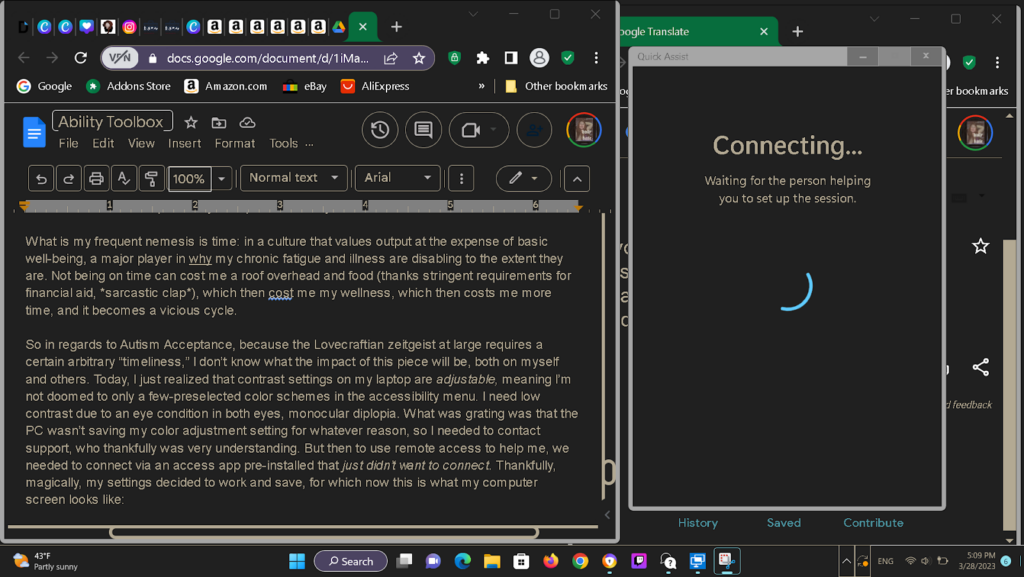
(I have a few Amazon tabs open to look at ergonomic mice for disability; I hate supporting Bezos, but unfortunately Amazon is the most accessibility-friendly site for me, due to being able to buy equipment I need, having it delivered right to my door because I can’t always walk to get it and packages are frequently stolen, and finally, because as a poor person, I use money-making apps under the table to obtain Amazon gift cards because I live below the poverty threshold, and anything helps when counting pennies.)
Accessibility needs that are left unmet quickly snowball, so I can easily spend a whole day only doing a few things because of the time devoted to being both a secretary and a manager for my own life, just to survive: scanning, faxing, emailing, calling, opening mail, filling forms, sending mail, planning appointments and transportation, managing several schedules, etc. I work full-time, no, overtime, as a full-time stay-at-home mom who is disabled. The work, instead of coming home with me, is just always home, and the penalties are severe if I don’t do it. Instead of receiving a paycheck though, I have part of my rent paid off and the rest goes to food. I don’t see a dime otherwise, and this only totals to about $800 a month for three people: my husband, daughter, and I. And if I don’t respond to the Department of Social Services’ return requests (arriving via snail mail) within 10 days, I risk my case getting closed. And I can’t predict when the mail is going to be late, which happens often, which is the ONLY way the department communicates TO me. (The pandemic is the only reason we now have the ability to upload paperwork ONLINE instead of having to go in person, which is hell when you feel like you have pneumonia and the flu 24/7).
I laughed bitterly because of how much time it takes for me to obtain the resources I need, if I can at all, because I’m dirt poor. I laughed because it can take all day to do what are considered “simple” tasks by workspaces and employers, a space I can no longer last a day in, after working my whole life since middle school. I laughed because, “Shit, another deadline missed. Maybe I could have made some money to pay a bill, but because of my illness and all the chronic stress, I missed it… AGAIN.” I laughed because of dealing with the whole fiasco of just trying to make my laptop easier for me to use. I finally have a computer screen that is less likely to slow me down and cause migraines for the rest of the day, because I see this:
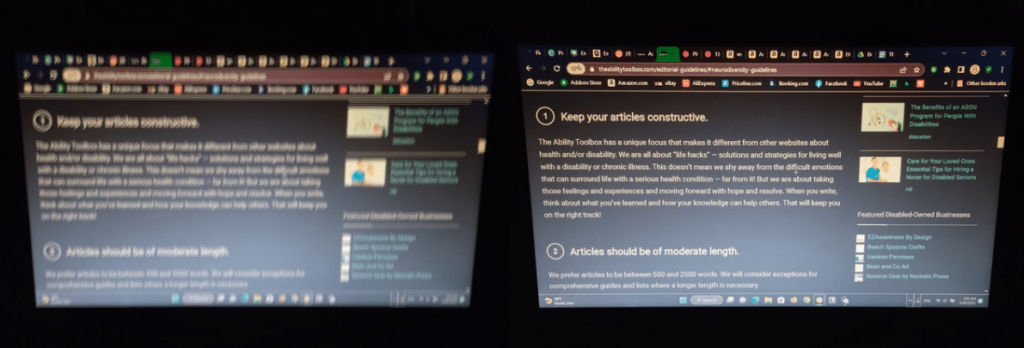
I’ve tried multiple eyeglass prescriptions: the only things that dampen the diplopia are blue light glasses (to filter down higher-frequency colors closer to ultraviolet than infrared), an eyepatch (to reduce my field of vision to lower sensory overwhelm, and using whatever accessibility settings are available, such as nighttime options, turning the screen more amber, or changing the font style and size (some fonts are harder to decipher, ergo more excruciating to process). My PC has more settings than my phone, but on the flip side, I can’t lie down and make myself comfortable with a PC in the same way I can with a phone, and I need to lie down several times throughout the day… sometimes the whole day.
At least now I just received my corset; I don’t qualify for post-partum breast reduction surgery because of the risks from being overweight, but I can’t lose weight quickly if the breast weight is too heavy to breathe to walk, let alone exercise, all because I was exposed to black mold daily for 4 months after having a baby. Thankfully my husband and child recovered, but my life, and therefore theirs, has changed drastically. Child-rearing equipment is made with the assumption that parents are fully-able bodied, and I was, prior to the mold exposure.
So I laughed bitterly, because yet again, in a space that is about visibility and accessibility, I still find myself battling the same barriers at least initially, because of how the US of A is a max-abledness-centric society; it’s not just social norms, but also laws and requirements. It is a precarious balance of trying to heal what I can, help what I cannot (accessibility), and simultaneously hiding any healing from agencies that take any inkling of improvement as a divine sign that *BAM* I can magically hold employment again.
It’s a self-gaslighting clusterfuck.
So here I am, because I genuinely want to share my knowledge with the world. So much of this changed my life drastically, but I shouldn’t have had to learn it in grad school in my Human Development studies; this information should be FREE — part of the norm! — because of how much we depend on knowledge to empower our wellness as living organisms. But that process of sharing can be incredibly discouraging sometimes, because I can barely function as a human. I have a home aide, and I’m only 29, meaning, a common reaction is disbelief that someone my age could *gasp* need help. Especially as a mom, the world seems to discount you as a person after the umbilical cord has been severed. And a disabled mom? Why didn’t I hire a fortune teller to learn I would become disabled right after having a baby? Disabled people can’t be good parents, right?!? (*sarcastic eye roll*)
Simply by putting these weird, arbitrary, human-made squiggles into the digital ether, squiggles that somehow represent sounds, which represent words, which have meaning, when strung together can somehow present someone’s life tapestry or mosaic…. Somehow in the process of sharing my squiggles, I hope others out there who are invisible, marginalized, fighting to keep their head above water and barely treading it… will be able to find meaning in my squiggles, and hopefully feel a little less alone.
(Squiggles are weird like that, eh?)

![The [in]Visibility of [in]Accessibility](https://theabilitytoolbox.com/wp-content/uploads/2023/04/ehr-system-behavioral-health.jpg)
![The [in]Visibility of [in]Accessibility](https://theabilitytoolbox.com/wp-content/uploads/2023/04/internet-mental-health.jpg)
